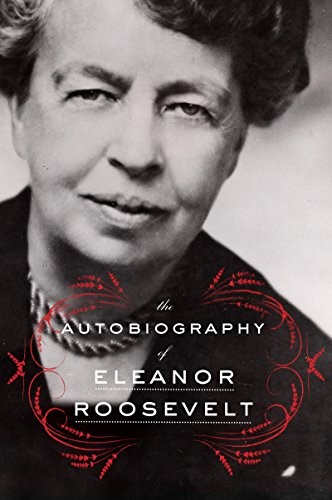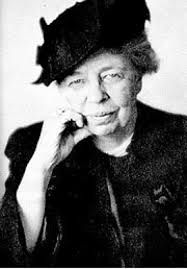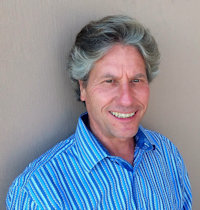The Autobiography of Eleanor Roosevelt

from amazon.com
The daughter of one of New York’s most influential families, niece of Theodore Roosevelt, and wife of President Franklin Delano Roosevelt, Eleanor Roosevelt witnessed some of the most remarkable decades in modern history, as America transitioned from the Gilded Age, the Progressive Era, and the Depression to World War II and the Cold War.
A champion of the downtrodden, Eleanor drew on her experience and used her role as First Lady to help those in need. Intimately involved in her husband’s political life, from the governorship of New York to the White House, Eleanor would eventually become a powerful force of her own, heading women’s organizations and youth movements, and battling for consumer rights, civil rights, and improved housing. In the years after FDR’s death, this inspiring, controversial, and outspoken leader would become a U.N. Delegate, chairman of the Commission on Human Rights, a newspaper columnist, Democratic party activist, world-traveler, and diplomat devoted to the ideas of liberty and human rights.
This single volume biography brings her into focus through her own words, illuminating the vanished world she grew up, her life with her political husband, and the post-war years when she worked to broaden cooperation and understanding at home and abroad.
https://www.amazon.com/Autobiography-Eleanor-Roosevelt-ebook/dp/B00ICN4ZUI
Author: Eleanor Roosevelt

Anna Eleanor Roosevelt (October 11, 1884 – November 7, 1962) was an American political figure, diplomat and activist. She served as the First Lady of the United States from March 4, 1933 to April 12, 1945 during her husband President Franklin D. Roosevelt's four terms in office, making her the longest serving First Lady of the United States. Roosevelt served as United States Delegate to the United Nations General Assembly from 1945 to 1952. President S. Truman later called her the "First Lady of the World" in tribute to her human rights achievements.
http://www.firstladies.org/biographies/firstladies.aspx?biography=33
Reviewed by: John Stokdijk

Eleanor Roosevelt was a remarkable woman but The Autobiography of Eleanor Roosevelt is not a remarkable book. She was not the best person to tell her own story. She seemed to have little ego and little interest in being famous, which is admirable, but perhaps she was too humble. The result was a book that was boring, at least for me. However, her life journey from ordinary to extraordinary has lessons for us all.
In her Preface she writes (but does not live up to) the following,
... I had two objectives: One was to give a picture, if possible, of the world in which I grew up and … to give as truthful a picture as possible of a human being.
Part 1 of her book covers the first 40 years of her life from birth in 1884 to 1924.
I was a shy, solemn child even at the age of two…
My mother was troubled by my lack of beauty, and I knew it as a child senses these things.
I had governesses, French maids, German maids. I walked them all off their feet. They always tried to talk to me, and I wished to be left alone to live in a dreamworld in which I was the heroine and my father the hero.
More
nd more, as I grew older, I used the quickness of my mind to pick the minds of other people and use their knowledge as my own.
Gradually I acquired a few friends, and finally going out lost some of its terrors; but that first winter, when my sole object in life was society, nearly brought me to a state of nervous collapse.
I lived in a totally unpolitical atmosphere.
I… lived under the compulsion of my early training; duty was perhaps the motivating force of my life, often excluding what might have been joy or pleasure. I looked at everything from the point of view of what I ought to do, rarely from the standpoint of what I wanted to do… the whole of my life remained centered in the family.
...while I was always a part of the public aspect of our lives, still I felt detached and objective, as though I were looking at someone else’s life.
By age 40 Eleanor Roosevelt was a wife and mother of six children and not much more. She was very much the product of her upbringing and the culture in which she lived. There is only the tiniest hint of greatness to come as we get glimpses of a woman who is learning constantly and absorbing much from all those around her.
Part 2 covers the years from 1924 until the death of her husband, President Franklin D. Roosevelt in 1945.
We get a picture of a woman who is valued and respected by her husband, a man who had an air of greatness from a young age, and that probably contributed much to her own growth.
Franklin often used me to get the reflection of other people’s thinking because he knew I made it a point to see and talk with a variety of people… To this day I have no idea whether he had simply used me as a sounding board, as he so often did, with the idea of getting the reaction of the person on the outside or whether my arguments had been needed to fortify his decision and to clarify his own mind.
Part 2 seemed to be more interesting but that was probably because I had greater interest myself in the geopolitical events of those years. Eleanor Roosevelt was perfectly positioned to give us insights into her husband’s thinking and actions as a four term President. But Eleanor’s own words reveal why I feel little connection to her.
To tell the truth, I do not think I ever stopped to analyze my feelings. There was so much to do to manage the household and the children and to try to keep things running smoothly that I never had time to think of my own reactions. I simply lived from day to day and got through the best I could.
From the personal standpoint, I did not want my husband to be president… It was pure selfishness on my part, and I never mentioned my feelings on the subject to him.... for myself I was deeply troubled. As I saw it, this meant the end of any personal life of my own.
Slowly another side of Eleanor Roosevelt emerges.
Personal work, such as my column, articles, books, radio scripts and the like… As time went by I found that people no longer considered me a mouthpiece for my husband but realized that I had a point of view of my own with which he might not at all agree. Then I felt freer to state my views. However, I always used some care, and sometimes I would send Franklin one of my columns about which I was doubtful.
But I wanted much more about those columns from Eleanor Roosevelt herself than she ever gives us in her book. This frustrated me as I read the book. It almost seemed that she was unaware of her rising popularity and impact.
She wrote at length about the numerous royal visitors and other visitors to the White House. No doubt this was exciting and meaningful for her but boring for me to read. No Ordinary Time: Franklin & Eleanor Roosevelt: The Home Front in World War II by Doris Kearns Goodwin was far more interesting.
Strangely, as I was reading I was looking forward to the death of FDR, expecting a new Eleanor Roosevelt to blossom. Of course, she misses her husband deeply as they had worked together as a great team. Yet there is more that I wished she would say, but she doesn’t.
As time went on, the fact that I kept myself well occupied made my loneliness less acute.
Part lll is entitled On My Own and this was one reason I had persevered through earlier chapters. Now came the part that I was most interested in, her work with the United Nations and the Human Rights Commission. Here again we see the vast distance between how other’s perceived Eleanor Roosevelt and how she perceived herself.
In December of 1945 I received a message from President Truman. He reminded me that the first or organizing meeting of the United Nations General Assembly would be held in London, starting in January, 1946, and he asked me if I would serve as a member of the United Nations delegation. “Oh, no! It would be impossible!” was my first reaction. “How could I be a delegate to help organize the United Nations when I have no background or experience in international meetings?”
I my view, everyone should read the Universal Declaration of Human Rights at least once.
Seeing the world after WWll through the eyes of Eleanor Roosevelt was insightful. It was a time of transition, the end of colonialism, the transformation of Germany and Japan, the rise of a communist Soviet Union and the beginning of the Cold War, and more. But I also felt a lingering sadness as she and others worked to build a new world order.
… this bold new concept of an organization (the United Nations) that might be our only hope of avoiding future wars.
The UN has never lived up to expectations and today it is a marginal player in world affairs. Instead we seem to be witnessing a rapid decline in the world order that has prevailed for over seventy years. Today we seem to again be on the verge of another great transition, the shape of which is not at all clear at this time.
The visits that Eleanor Roosevelt made to the Soviet Union and her interactions with Nikita Khrushchev were fascinating. She was, inevitably, a product of her times. No one could have foreseen the end of the Cold War and the collapse of communism. No one could have foreseen the decline of healthy democracy in the United States. She would be completely disoriented in the world of today.
Chapter 41 was the one that I enjoyed the most. It was 1959 and Eleanor Roosevelt had reached her seventy-fifth birthday. She looks back on her life introspectively and again reveals why I do not connect strongly with her, although I do respect her and admire what she made of her life.
This kind of introspection is one in which I rarely indulge… its danger is that one may easily tend to become self-absorbed in one’s voyage of discovery and self-analysis.
Actually I never planned a career, and what basic objective I had, for many years, was to grasp every opportunity to live and experience life as deeply, as fully, and as widely as I possibly could… I had really only three assets: I was keenly interested, I accepted every challenge and every opportunity to learn more, and I had great energy and self-discipline.
Eleanor Roosevelt would have loved Barack Obama and would have been completely horrified by Donald Trump, or am I projecting?
I do not see how we can retain world leadership and yet continue to handle our problems as though they concerned us alone; they concern the world.
She has a timeless warning for her country, more true today than the time of which she spoke, 1960.
…democracy depends upon the participation of the people in their government. It cannot survive by boss rule. (What today we call the political elite.)
There are two matters on which Eleanor Roosevelt is silent and consequently her story, as she tells it, is very incomplete.
She does not even mention the name Lucy Mercer with whom FDR had an affair which Eleanor Roosevelt discovered early in her marriage. In her Preface she promised us an honest account of her life. But she did not give a complete and honest account of her marriage.
She mentions Hick (Lorena Hickok) only a few times who, at the very least, was her closest friend and possibly her one true love. This relationship can be explored in Eleanor Roosevelt’s own words, but not in her autobiography.
One of my favorite blogs is brain pickings written by Maria Popova. She has many posts about Eleanor Roosevelt, all well worth exploring. Relevant to the complete story of Eleanor Roosevelt is the post entitled Eleanor Roosevelt’s Controversial Love Letters to Lorena Hickok.
Hick darling
All day I’ve thought of you & another birthday I will be with you, & yet tonite you sounded so far away & formal. Oh! I want to put my arms around you, I ache to hold you close. Your ring is a great comfort. I look at it & think “she does love me, or I wouldn’t be wearing it!”
From Popova I learned that “Though many of the most explicit letters had been burned, the 300 published in Empty Without You: The Intimate Letters Of Eleanor Roosevelt And Lorena Hickok — at once less unequivocal than history’s most revealing woman-to-woman love letters and more suggestive than those of great female platonic friendships — strongly indicate the relationship between Roosevelt and Hickok had been one of great romantic intensity.”
Is this the same Eleanor Roosevelt that wrote her autobiography?
Another quote from Maria Popova seems an appropriate ending for this book report.
Eleanor Roosevelt (October 11, 1884–November 7, 1962) knew that she was dying when she began writing Tomorrow Is Now (public library). She was seventy-eight and continued to work on this visionary, timeless manifesto even as she grew too weak to speak or hold a cup of tea. She described the book as “one woman’s attempt to analyze what problems there are to be met, one citizen’s approach to ways in which they may be met, and one human being’s bold affirmation that, with imagination, with courage, with faith in ourselves and our cause — the fundamental dignity of all mankind — they will be met.” It was published several months after Roosevelt’s death and remains an immensely elevating vision for our individual role in shaping our shared human future — an antidote to apathy more necessary than ever.
